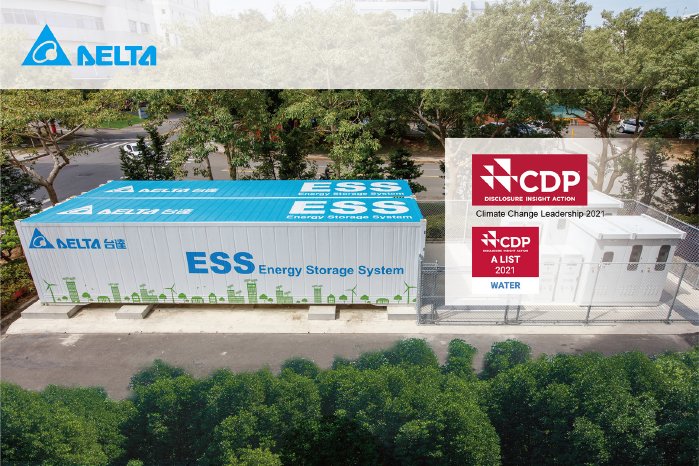Jesse Chou, Delta's Chief Sustainability Officer, said Delta has long been concerned with climate change and aligns with international sustainability initiatives. After passing the Science-based Targets (SBT) in 2017, Delta has far surpassed its annual goals for three consecutive years through self-directed energy reduction, self-generation of solar energy, and the purchase of green power or international renewable energy certificates. In 2020, Delta reduced its carbon intensity by 55%, and the proportion of global locations using renewable electricity reached 45.7%. Based on the experience and results of SBT implementation, Delta has further joined the RE100 this year and pledged to achieve 100% renewable electricity and carbon neutrality in all global operations by 2030, echoing the global trend toward net-zero carbon emissions. Delta also attaches great importance to water security management and continues to improve water efficiency and wastewater treatment efficiency in its operations. Delta strengthens the resilience of regional water resources and reduces the impact of water pollution while assisting high-risk suppliers in making improvements. The Delta Foundation also recently screened Delta's marine environmental documentaries "The Birth" and "Life in the Coral Reefs" at the COP26 United Nations official negotiating area to raise public awareness of the impact of climate change on the oceans and expand corporate influence. We are pleased that Delta's efforts and achievements in addressing the risks of climate change and water security have been recognized by CDP and other significant international organizations.
To identify and manage climate change and water-related risks and opportunities, Delta introduced the Task Force on Climate-Related Financial Disclosures (TCFD) in 2017, which discloses information such as climate governance, strategies, risk management, and indicative targets, and is updated annually. In 2018, Delta became the world's first TCFD supporter in the technology industry. Over the years, Delta has used scenario analyses to assess the risks and opportunities climate change brings for the Company from the perspectives of products and services, supply chain, R&D investment, and operations. Delta was able to quantify and prepare financially and focus on high-performance products, key components for electric vehicles, green buildings, and renewable energy to achieve the development goal of low-carbon transformation. From 2010 to 2020, Delta's high-efficiency products helped customers worldwide save 33.5 billion kWh of electricity, equivalent to reducing 17.8 million tons of carbon emissions. In 2020, Delta's 15 certified plants and buildings and five donated academic green buildings saved a total of 18.48 million kWh of electricity, equivalent to a reduction of 11,685 tons in carbon emissions. The plants have also implemented 80 water conservation programs and 111 waste reduction programs, saving 183.6 thousand tons of water and 7,774 tons of waste. *
For water risk at major production sites and supply chains, Delta uses the water risk assessment tool developed by the World Resources Institute (WRI) to identify the baseline water stress level, measure the risk level, and make improvements (e.g., elevated foundations) in conjunction with operational conditions. Delta also selects approximately 600 suppliers from the top 80% of the annual purchase amount as drought risk assessment targets and incorporates the assessment results into Delta's decision-making basis. At the same time, Delta provides its water conservation experience in plants and green buildings to high-risk suppliers to help them respond to climate change. Delta also continues to reduce water demand in its operations. All plants and facilities within its management area are equipped with electronic water meters combined with the Delta Energy Online system and the DIAEnergie industrial energy management system. This allows Delta to continuously optimize equipment operation efficiency using systematic data analysis, improve production processes, and develop water management strategies to enhance water use efficiency.
CDP is a founding member of the Science Based Targets Initiative (SBTi), the We Mean Business Coalition, the Investor Agenda, and the Net Zero Asset Managers initiative, whose annual environmental disclosure and scoring process is considered an essential standard of transparency for corporate environmental information. In 2021, more than 14,000 organizations worldwide disclosed data about environmental impact, risks, and opportunities through CDP, including more than 13,000 companies with a total market capitalization of over 64% of the world and covering more than 1,000 cities, states, and regions. A total of 272 companies received top honors for transparency and performance on climate change, forests, and water security with an A-List leadership rating.
* Please refer to the 2020 Delta Electronics ESG Report


